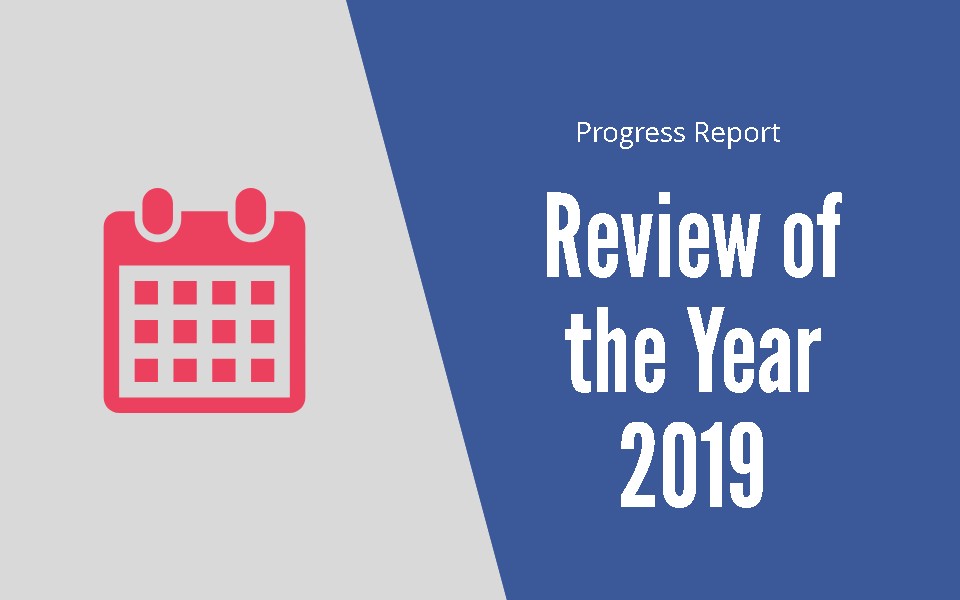It is time to take a few steps back and do a review of 2019. Of course, I don’t intend always to write only progress reports, but 2019 was a busy, challenging year. So I promise that my next post will be more technical, code- or Mathematics-related.
Refinement of the goals during the learning process
In the latest post, I already discussed shifting my focus from pure Python programming to a deep understanding of Machine Learning. It meant appending my Python progress for a while and starting a new course about Machine Learning by Andrew Ng. You have to implement what you learnt with coding. You could only solve the tasks if you understood every bit of information related to a specific model or application. The only drawback is that you should use Octave/MatLab as a programming language instead of Python. But keep in mind that the focus of the course was not programming.
It was a pleasant surprise that I could still remember the most relevant topics like multiplication of vectors, matrices, eigenvalues, eigenvectors, inversion, transpose of matrices, etc.
Meetups, conferences, workshops
I visited about 15 different meetups, workshops last year. They were great opportunities for learning about new topics related to:
Artificial Intelligence,
Machine Learning, Python programming and
Cloud computation.
You can become familiar with this field, the audience, the culture. I am coming from a Mechanical Engineering, CFD simulation field. It is something different from “classical”, always IT-related experiences and career paths.
The last thing that might be important is that you should not expect to learn everything only at meetups, workshops, or conferences. There are a lot of people, but time is limited.
You can’t skip learning, reading, actively coding on your own, solving minor problems alone.
Diet, training, sleeping
You might wonder why am I writing about this topic. Well, the answer is simple. It doesn’t matter whether you are a genius or have bought the best book or course related to Machine Learning. If you are not fit mentally and physically, don’t eat properly and don’t sleep enough, you won’t learn effectively. Physical activity can improve your brain’s performance, and sleeping plays a crucial role in learning and understanding new concepts.
Last year I registered 77 training sessions. Most of them were workouts in the gym (weightlifting). The ideal frequency of training would be working out three times a week in the gym and going jogging/swimming/cycling. But I am not disappointed. Commuting 3,5 hours a day, four days a week, was challenging. I was a bit sick for one or two weeks, and sometimes I was on vacation or a short trip abroad. I hope that in 2020 I will manage to do more training sessions.
Job-seeking, interviews
I noticed an exciting trend that in 2019 I did not receive so many offers related to the simulation engineering roles as earlier. I made a well-thoughts refinement of my CV-homepage (rideg.eu), and I wrote three posts related to Machine Learning and the learning process. In addition, I “cleaned” my homepage and LinkedIn profile from skills and keywords associated with this “old” simulation world I’m trying to leave now. Some recruiters still thought me to be an experienced (5+ years) software developer, which I did not completely understand, but it was only a few exceptions.
I went to three different interviews. One of them was in the automotive industry with a British background, but they were looking for someone more experienced.
The second position was at a company mainly focusing on Machine Learning and Data Analysis. I enjoyed the atmosphere there. They were friendly and easy-going. For me, it was exciting to work on small challenges on weekends, which were necessary as a qualification for an interview. Solving problems, learning about Markov-chains, understanding what is a confusion matrix is. The process of learning something utterly unrelated to my experience was exciting and awakening.
For example, I remembered learning about numerical series, which could converge to a finite value if you apply their formulas “infinite” times. I remembered as well at matrices. But I never thought that you could have matrices, which elements are numerical series. So even matrices could converge to a final matrix if you multiply them several times (“infinite” times). Connecting two (for me) completely different topics from Mathematics and learning a new concept was something freshening mentally. I would guess that these matrices are used in Physics when trying to model atomic disintegration over time, dealing with particles and probabilities. But that’s only my assumption. It is just a short example of how I like understanding and learning new things based on things I already know and combining them into something new.
The fact that they saw my solutions for the test (which were far from perfect or complete) as promising and good enough for a personal interview proved that I might find my place in the field of Machine Learning, even if I’m coming from a different area.
The third company I visited had great potential as well. It was founded by young mechanical engineers who went through the learning process I’m going through right now. They learned to code, read scientific papers, solve Machine Learning and Data Analytical problems. We talked with each other several times on the phone and face to face as well, and we could agree on the details of a new position there.
Summary
It means that soon I will close the actual chapter of my career as a CFD simulation engineer and open a brand new one related to Artificial Intelligence, Machine Learning, Cloud Computing and Software development. It feels like jumping off the cliff on a beach, and the water might feel deep and cold initially, but I am sure that this is where I should continue my career.
I wrote my review of the year 2019, focusing on the challenges of career transition to Machine Learning and software development.

